| Information
Service of
the Serbian Orthodox Church
September 24, 2004


COMMUNIQUE
OF THE HOLY ASSEMBLY OF BISHOPS
OF THE SERBIAN ORTHODOX CHURCH
FURTHER
DISCRIMINATION AGAINST BISHOPS
OF THE SERBIAN ORTHODOX CHURCH BY SKOPLJE GOVERNMENT
It
is with bitterness that the Holy Assembly of Bishops of the Serbian
Orthodox Church received the report of His Grace Bishop Artemije
of Raska and Prizren that on September 21, 2004 representatives
of the Former Yugoslav Republic of Macedonia border patrol advised
him at the Djeneral Jankovic border crossing that he “is not allowed
to enter or transit through Macedonia”. On that occasion they
showed him a written decision by the government in Skoplje that
clearly states that “at the request of the Macedonian Orthodox
Church entry and transit through Macedonian territory to members
of the Serbian Orthodox Church whose names appear on the attached
list is prohibited”. Bishop Artemije was also able to see the
list of names and established that it includes the names of at
least twenty bishops of the Serbian Church.
The
bitterness of the Holy Assembly of Bishops as a result of this
practice, which is not new but has been going on for a decade,
of the undemocratic government in Skoplje to humiliate and turn
back Serbian bishops, priests, monks and nuns from border crossings
with FYR Macedonia is all the greater because, despite everything,
the August reassurances of Skoplje officials that domestic legislation
is being built on the highest European Union standards was believed.
It has turned out that they plan to build their “European perspective”
on the quicksand of lies and violence.
The
Holy Assembly of Bishops is especially shocked by the lack of
interest and indolence of the Belgrade government with respect
to the protection of elementary human rights of the citizens of
Serbia, in this case, a bishop of the Serbian Orthodox Church.
It is incomprehensible that not one official in Belgrade has yet
found it appropriate to direct a single word of protest to Skoplje.
Finally,
the decision of the government in Skoplje to discriminate against
the hierarchs and clergy of the Serbian Orthodox church “at the
request of the Macedonian Orthodox Church” only confirms that
this so-called Church is in practice a political institution par
excellence, and that it was established and exists only for political
interests.

THEOLOGICAL
SYMPOSIUM IN POZAREVAC
On
Friday, September 24, 2004 at the Theological Faculty of the Serbian
Orthodox Church (Mije Kovacevica Street number 11b) the work of
the Theological Symposium organized in honor of the ten-anniversary
in office of His Grace Bishop Ignjatije of Branicevo, a regular
professor at the Theological Faculty, will begin at 6:00 p.m.
with a lecture by His Eminence Metropolitan Joannis Zizioulas
of Pergamum, followed by a formal Academy at 7:00 p.m. The symposium
will continue on Saturday and Sunday in Pozaravec in the bishop’s
residence of Bishop Ignjatije.
Schedule
of lectures:
Friday,
24 September, 2004 – Belgrade, Faculty of Theology of the Serbian
Orthodox Church, Mije Kovacevica Street number 11b
6:00 p.m. - His Eminence Metropolitan Joannis Zizioulas of Pergamum
7:00 p.m. – Formal Academy
Saturday,
September 25, 2004 in Pozarevac Cathedral, Hajduk Veljkova Street
number 2
11:00 a.m. – Protopresbyter-Stavrophor Dr. Radomir Milosevic from
Smederevo and Professor Stavros Jagazoglu, Athens
5:30 p.m. – His Eminence Metropolitan Joannis Zizioulas of Pergamum;
Sunday,
September 26, 2004 in Pozarevac Cathedral, Hajduk Veljkova Street
number 2
9:00 a.m. – Holy Hierarchal Liturgy.

THE
CHURCH AND THE MEDIA
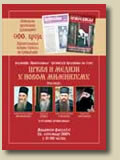 On
Tuesday, September 28, 2004 at 7:00 p.m. in the amphitheater of
the Faculty of Machine Engineering, on the occasion of the publication
of the 900th issue of “Pravoslavlje” (Orthodoxy), the periodical
of the Serbian Patriarchate, the editorial board of this eminent
periodical is organizing a lecture on the topic: THE CHURCH AND
THE MEDIA IN THE NEW MILLENNIUM. Scheduled participants include
His Eminence Metropolitan Amfilohije of Montenegro and the Littoral,
His Grace Bishop Irinej of Backa, His Grace Bishop Grigorije of
Zahumlje and Herzegovina, His Grace Bishop Porfirije of Jegar,
and the editors of “Pravoslavlje”. On
Tuesday, September 28, 2004 at 7:00 p.m. in the amphitheater of
the Faculty of Machine Engineering, on the occasion of the publication
of the 900th issue of “Pravoslavlje” (Orthodoxy), the periodical
of the Serbian Patriarchate, the editorial board of this eminent
periodical is organizing a lecture on the topic: THE CHURCH AND
THE MEDIA IN THE NEW MILLENNIUM. Scheduled participants include
His Eminence Metropolitan Amfilohije of Montenegro and the Littoral,
His Grace Bishop Irinej of Backa, His Grace Bishop Grigorije of
Zahumlje and Herzegovina, His Grace Bishop Porfirije of Jegar,
and the editors of “Pravoslavlje”.

HOLY
MOUNTAIN – ETERNAL LIGHT
 In
search of Truth, full of Spirit, a young artist heads for the
Holy Mountain (Mt. Athos) to immortalize that in which he believes
and to which he aspires. Thus begins the story of a multimedia
CD that is unique in our region. The Orthodox photographer, Vladimir
Gogic, visits the Holy Mountain over the course of a decade in
search of pictures that will connect the past, the present and
the future, following the spirit of Orthodox tradition. As he
walks down the mountain paths of Mt. Athos he records everything,
peers into every corner, under every stone, and continues on…
The eschatological and the present interweave in every scene and
revitalize faith in the divine and earthly importance of the Holy
Mountain. In
search of Truth, full of Spirit, a young artist heads for the
Holy Mountain (Mt. Athos) to immortalize that in which he believes
and to which he aspires. Thus begins the story of a multimedia
CD that is unique in our region. The Orthodox photographer, Vladimir
Gogic, visits the Holy Mountain over the course of a decade in
search of pictures that will connect the past, the present and
the future, following the spirit of Orthodox tradition. As he
walks down the mountain paths of Mt. Athos he records everything,
peers into every corner, under every stone, and continues on…
The eschatological and the present interweave in every scene and
revitalize faith in the divine and earthly importance of the Holy
Mountain.
Vladimir
Gogic skillfully captures moments of everyday and eternal life
on the Holy Mountain; through a photo lens he speaks with monks,
kisses icons, rings the bells and prays to God. This approach
allows for the prayerful composition of a sequence of scenes depicting
the eternal Light of the Holy Mountain. His photographs depict
all the tasks for future generations – to preserve, renew and
repair what the passage of time has worn thin. All the photographs
are connected in a whole called “Holy Mountain – Eternal Light”.
Mr. Branislav Glisic adds a comprehensive film portrait to the
sequence of photographs with an expertly chosen musical background.
The pictures are accompanied by sound neither diminishing nor
increasing them but accompanying them and thus creating a total
experience of life on the Holy Mountain. Contributing to the complete
success of this edition is a selection of texts chosen by Ljubomir
Panic.

PHYSICIANS
OUT OF LOVE
ORTHODOX HUMANITARIAN ORGANIZATION
OPENS BRANCH IN BITOLJ
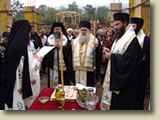 The
international association Physicians Out of Love, which exists
in most Orthodox countries, has recently opened a branch in the
Former Yugoslav Republic of Macedonia. The idea to found a branch
in Macedonia dates back to 2002 but could not be realized until
now because the FYR Macedonia prohibited entry to bishops and
clerics from other countries. The
international association Physicians Out of Love, which exists
in most Orthodox countries, has recently opened a branch in the
Former Yugoslav Republic of Macedonia. The idea to found a branch
in Macedonia dates back to 2002 but could not be realized until
now because the FYR Macedonia prohibited entry to bishops and
clerics from other countries.
Representatives
of the association from Greece, Bulgaria and Serbia gathered on
September 18, 2004 in the Molika Hotel on Mt. Pelister where a
branch of this association from FYR Macedonia was accepted into
the international organization. This international organization
works under the auspices of the Church.
After the
official meeting the guests, including His Eminence Metropolitan
Ignatios of Demetrias and Almyros (Volos, Greece) and His Eminence
Metropolitan Kyrill of Varna and Veliki Preslav (Bulgaria), and
their host, His Eminence Metropolitan Jovan of Veles and Povardarje,
the Exarch of Ochrid, as well as His Grace Bishop Marko of Demvic,
the Administrator of Bitolj, toured the famous churches and monasteries
of Ochrid.
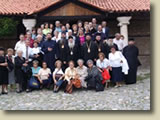 On
Sunday morning, September 19, in the monastery of St. John Chrysostom
in the village of Nizepole Holy Hierarchal Liturgy was served
with Metropolitan Ignatios officiating with the concelebration
of Metropolitan Kyrill and Metropolitan Jovan. Metropolitan Jovan
presented the guests to the people present, wishing them welcome
and success in the work of Physicians Out of Love. In his response
to this warm welcome, Metropolitan Ignatios on behalf of all the
guests wished that the blessing of God might always remain with
Metropolitan Jovan that he might endure even more difficult challenges
than those that confront him. On
Sunday morning, September 19, in the monastery of St. John Chrysostom
in the village of Nizepole Holy Hierarchal Liturgy was served
with Metropolitan Ignatios officiating with the concelebration
of Metropolitan Kyrill and Metropolitan Jovan. Metropolitan Jovan
presented the guests to the people present, wishing them welcome
and success in the work of Physicians Out of Love. In his response
to this warm welcome, Metropolitan Ignatios on behalf of all the
guests wished that the blessing of God might always remain with
Metropolitan Jovan that he might endure even more difficult challenges
than those that confront him.
“We live in
a country that has freedom of religious expression. We can build
churches, monasteries, seminaries and other institutions. We have
everything that a Church in the 21st century might desire. Nonetheless,
we have come here to visit the age-old Churches. To remember that
the Church was once in catacombs, just as you are now. We have
come to remind that martyrdom is a valid criterion of the Church.
I cannot tell you that we aspire to martyrdom; however, I emphasize,
we want you to endure. This Liturgy will never be forgotten by
any of us who took part in it. It is thanks to your prayer and
strong faith that the heavens closed so we could serve it out
in the open, for had it rained, we would not have anywhere to
serve it. Even though it has been raining since our arrival yesterday
and continues to rain around us now, here the sun is shining because
God wants to show His presence among us. Rest assured, dear Bishop,
that you are on the right path. You are the yeast that will make
all the dough rise. We would be pleased if others, too, who are
still in apostasy would come to this gathering where we are present
to see the fruits and that we might rejoice with them. We Greeks
have a saying that children only throw stones at trees that bear
fruit. You have shown us all this fruit-bearing and you have become
a model and example from which we all are learning how to truly
witness the Church of Christ.”
Metropolitan
Ignatios presented Metropolitan Jovan with an icon of the Most
Holy Theotokos of Jerusalem plated in gold and silver.
After Liturgy
those present took part in a religious procession to the location
where a paraklis (chapel) dedicated to Christ, the Life-bearing
Source is being built. Metropolitan Ignatios consecrated the cornerstone
of the paraklis with the concelebration of Bishop Marko of Dremvic.
The physicians,
dentists, pharmacists and other medical workers who came to Nizepole
from several Balkan countries were deeply touched by the manner
in which the Orthodox Archdiocese of Ochrid is witness to its
faith, and all of them expressed the conviction that the next
congress of Physicians Out of Love, to be held in October 2005,
should be held in Bitolj.
Physicians
Out of Love participates in various international philanthropic
missions in Africa and India. As well, they help to finance many
projects of medical protection in the Orthodox Church.
At the Liturgy
served in the monastery of St. John Chrysostom in Bitolj, on the
basis of a request to be received addressed to the Orthodox Archdiocese
of Ochrid, Borjan Vitanov, previously a priest in the apostatic
MPC, was received into the priesthood. Father Borjan left his
spiritually destructive apostasy and joined the Body of Christ,
God’s Church, which on the territory of FYR Macedonia is called
the Orthodox Archdiocese of Ochrid.
When asked
by a reporter whether this spoils good relations between the Bulgarian
and Macedonian Orthodox Church, Metropolitan Kyrill of Varna and
Veliki Preslav responded that there have never been any relations
between these two churches. The Macedonian church has been in
apostasy for many years and has never been recognized by the Bulgarian
Orthodox Church.
The
sole canonical Church in FYR Macedonia is the Archdiocese of Ochrid.
It is wise of the Macedonian Church to remain silent because we,
too, are silent regarding many matters relating to them.

COUNCIL
OF EUROPE INITIATIVE IS UNACCEPTABLE BECAUSE IT IGNORES ROLE OF
SERBIAN ORTHODOX CHURCH, THE SERBIAN PEOPLE AND STATE
1.
Participation of Serbian representatives in the work of the international
Commission for directing restoration of churches in Kosovo and
Metohija, which was formed on August 18 in Pristina, has been
discontinued followed the emergence of negative trends in its
work to date.
Since
the Commission has deviated from recommendations of the Council
of Europe and begun to implement its own concept in the restoration
process which differs from that agreed upon, Bishop Artemije of
Raska-Prizren and Kosovo-Metohija publicized that the Memorandum
signed for the purpose of defining the restoration process was
no longer valid, as well as that "all possible decisions
and acts by the Commission dated after the letter sent to UNMIK
on September 13, 2004 no longer have legal validity nor are they
binding in any respect for the Diocese of Raska-Prizren and Kosovo-Metohija".
With
this the international Commission for directing restoration of
churches in Kosovo and Metohija ignominiously ended its mission,
missing and failing to achieve the target for which it was created.
The process of restoration of churches and monasteries will not
take place in the manner planned, i.e. through the Commission
for restoration; instead, new modalities will have to be found.
In the meanwhile, without waiting for the definition of new mechanisms
for restoration, the Diocese of Raska-Prizren and Kosovo-Metohija
has begun restoration of the destroyed monasteries, starting work
on the monasteries of Devic and Holy Archangels from its own humble
means through its Rade Neimar diocese construction center. Work
is also expected to begin within days on the monastery of Zociste.
2.
"The initiative of the Council of Europe embodied in the
Independent international Commission formed on September 10, 2004
in Paris by the Council of Europe, the European Commission and
UNMIK, as well as the document published at that time under number
AT04 224 rev2 dated 15.09.2004 are unacceptable from the perspective
of the Serbian people and the Serbian Orthodox Church as the creator,
owner and user of the Serbian cultural heritage," stated
Bishop Artemije in his letter to the Independent international
Commission. "We will not allow the implementation of such
initiatives on the ground and we will decisively raise our voice
against the usurpation of our rights by any organization or initiative
with respect to the protection and care of our cultural heritage,"
the Bishop said in the aforementioned letter.
"If
such initiatives are implemented on the ground against our will
and without our agreement," concluded the Bishop, "this
will be yet another in a series of acts of violence committed
in Kosovo and Metohija during the last five years, and a clear
testimonial of the intentions and character of those who do this".
The
primary objections presented by the Diocese of Raska-Prizren and
Kosovo-Metohija to the above-mentioned document, published when
the Independent international Commission was formed, relate to
"circumventing and minimizing the role of the Serbian state
and the Serbian Orthodox Church in the protection of their own
cultural heritage in Kosovo and Metohija".
"Whence
the intent and desire to take care of the entire heritage in Kosovo
and Metohija," asks Bishop Artemije in his letter to the
Independent Commission, "when there is a living and existing
host in the house, and that is Belgrade with its institutions,
the Serbian Orthodox Church and the Serbian state?
"Who,
after all, can take better care of this heritage and protect it
than those who created it, who are its owners, guardians, who
live in it, who are ready to die for it? Certainly, according
to the laws of God and humanity and history, the mandate to care
for its legacy, to protect it, to make decisions about it belongs
first of all to the Serbian people, the Serbian state and the
Serbian Church. And only then those to whom the Serbian people,
under certain conditions, through its previously listed institutions,
entrusts it."
Even
though the cited Commission document states that it was formed
"as a direct and effective contribution to the direction
and harmonization of the efforts of the international community
to preserve the cultural heritage in Kosovo", Bishop Artemije
asks the sincere and responsible question "is it possible
for the cultural heritage in Kosovo to be preserved by those under
whose rule for the past five years in Kosovo and Metohija the
greatest monuments of Christian culture have been destroyed and
desecrated, that is, by the international community personified
by UNMIK?
"If
the international community has not succeeded in preventing the
continued destruction of Christian churches, Serbian churches
and monasteries during the course of five years, from June 1999
to today and if despite the presence of tens of thousands of the
best equipped and trained soldiers, during a time of peace, after
the end of war hostilities and armed conflicts, 150 Orthodox Christian
monasteries and churches have been destroyed and damaged, how
then will the international community by forming this Commission
influence 'the preservation of cultural heritage in Kosovo and
Metohija'? Do we dare, before God and before history, to entrust
this mandate to the international community, personified now in
numerous initiatives and commission, which are being formed? The
answer is clear, and it cries out from every victim of every crime
committed against the Serbian people, its churches and monasteries,
and its property over the last five years under the administration
of the international community."
In
his letter to the Independent Commission, Bishop Artemije is also
sharply critical of the manipulation that is being carried out
in official documents of the Commission with the term "Kosovo
cultural heritage" or "Kosovo heritage".
The
concept of "Kosovo cultural heritage" is a mythological
monster, which neither exists nor can exist.
"A
cultural heritage," emphasized Bishop Artemije in his letter,
"is a creation by an individual people, not a geographical
or regional concept. It is created by people who are members of
specific peoples in various historical epochs. So, too, in Kosovo
and Metohija, there is a Serbian cultural heritage, which is furthermore
an Orthodox Christian legacy, an endowment left to the present
generation of the Serbian people by their ancestors from previous
generations to guard, to respect and by studying it, to learn
who they are, what they are worth, where are their roots, their
goals, where are their well springs and their river mouths.
"In
addition to the Serbian heritage, there is also an Albanian one
and so on. A Kosovo heritage cannot exist for the simple reason
that some sort of people of Kosovo does not exist, has never existed
and can never exist. It is an artificial concept without basis
in history, in real life, which will vanish before it ever comes
into being. In Kosovo and Metohija throughout history there have
been Serbs, Albanians, Roma and other peoples but never any so-called
Kosovars."
In
conclusion, Bishop Artemije emphasizes that "the only way
for the international community to prove the sincerity of its
intentions and its readiness to stop implementing a policy of
double standards is for it to first find and capture the criminals
responsible for the destruction of 150 Serbian holy shrines, not
one of whom has been caught in the past five years, as well as
the criminals responsible for a multitude of other crimes committed
against the Serbian people (murders, robberies, destruction, etc.),
almost none of whom have been caught. To ensure, consequently,
a safe and secure life for all, the return of 250,000 Serbs and
other Albanians driven out. To prevent crimes against Serbs, Serbian
property and Serbian heritage from happening over and over as
in the past.
"To
enable compensation for damages to destroyed churches and monasteries
and their rebuilding. To do the same for other objects owned by
Serbs: houses, apartments, businesses, etc. To enable vacating
of usurped Serbian property and create conditions for it to be
returned to its real owners, and that they can enjoy it without
obstacles.
"Only
then will conditions exist for talks on other activities of the
international communities, on confidence building, on joint work
on the protection of the Serbian cultural heritage."

CENTENNIAL
OF CORONATION AND ANOINTMENT OF KING PETER I KARADJORDJEVIC OF
SERBIA OF BLESSED MEMORY
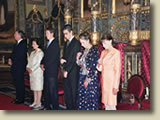 The
Serbian Orthodox Church and the Royal House of Karadjordjevic
commemorated this great and significant anniversary of Serbdom
with a series of prayers and ceremonies. The
Serbian Orthodox Church and the Royal House of Karadjordjevic
commemorated this great and significant anniversary of Serbdom
with a series of prayers and ceremonies.
On Tuesday, September 21, 2004, on the feast of the Nativity of
the Most Holy Theotokos in the Belgrade Cathedral, after Holy
Liturgy His Holiness Serbian Patriarch Pavle, with the concelebration
of the clergy, representatives of the Russian and Greek Churches,
the abbots and monks of numerous monasteries, served a short memorial
service to Serbian King Peter I the Liberator of blessed memory.
In addition to numerous faithful also praying for the soul of
the late King were the following members of the Royal House of
Karadjordjevic: HRH Crown Prince Alexander, Princess Katherine,
Prince Filip, Princess Jelisaveta, Princess Linda and Prince Mihajlo.
Responses during the Holy Liturgy and the memorial service were
sung by the First Belgrade Singing Society, which also performed
one hundred years ago at the coronation under the direction of
Stevan St. Mokranjac.
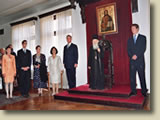 His
Holiness emphasized that King Peter was an exceptional individual
and a King in the truest sense, sharing the fate of his people
on its stauropaschal and golgothic path. His
Holiness emphasized that King Peter was an exceptional individual
and a King in the truest sense, sharing the fate of his people
on its stauropaschal and golgothic path.
After
Holy Liturgy and the memorial service the members of the Royal
Family visited the King Peter I Elementary School next to Belgrade
Cathedral. HRH Crown Prince Alexander laid a wreath at the memorial
to King Peter of blessed memory.
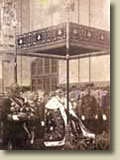 With
the blessing of His Holiness Serbian Patriarch Pavle, HRH Crown
Prince Alexander and members of the Royal House of Karadjordjevic
prepared a formal reception for eminent guests and reporters in
the Belgrade Patriarchate. With
the blessing of His Holiness Serbian Patriarch Pavle, HRH Crown
Prince Alexander and members of the Royal House of Karadjordjevic
prepared a formal reception for eminent guests and reporters in
the Belgrade Patriarchate.
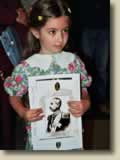 Members
of the Royal House and senior state officials of the Republic
of Serbia, including Serbian President Boris Tadic, then attended
the showing of the film “The Coronation of King Peter I” in the
Jugoslovenska Kinoteka (Yugoslav Film Theatre) in Belgrade Members
of the Royal House and senior state officials of the Republic
of Serbia, including Serbian President Boris Tadic, then attended
the showing of the film “The Coronation of King Peter I” in the
Jugoslovenska Kinoteka (Yugoslav Film Theatre) in Belgrade
To
the sound of the bells of the church of St. George in Oplenac
– the endowment of King Petar I Karadjordjevic – and accompanied
by a Honor Guard of the Serbia and Montenegro Army Guard Brigade,
HRH Crown Prince Alexander, Princess Katherine and Prince Filip
paid their respects to King Peter, laying a wreath on the grave
of the late King.

[Serbian
Translation Services]
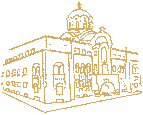
Copyright © 1999-2004 by
The Information Service of
the Serbian Orthodox Church
11000 Belgrade
Kralja Petra I no.5
+381 11 3282 596
e-mail
|

